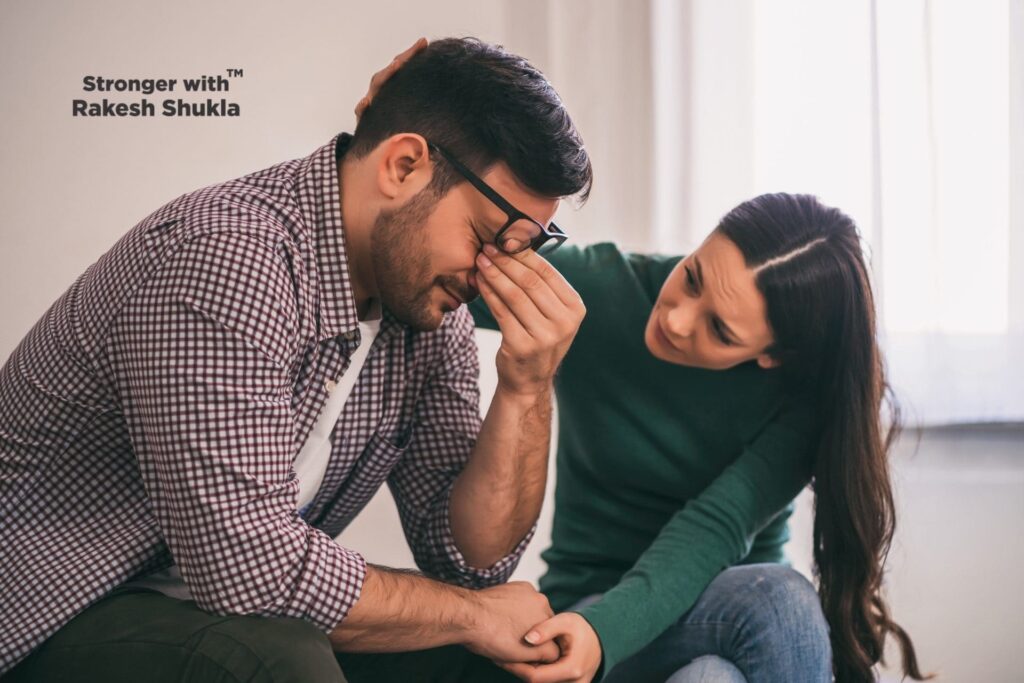Recognizing and Addressing Emotional Pain

The following is the transcript from the conversation.
Hi. Welcome back to Stronger with Rakesh Shukla and hopefully we’ll take another step today to make you stronger – emotionally, physically, and mentally. Most of the time they are pretty much the same thing. For today, let me first ask you this question.
If you look back at your life from your childhood to now, what do you think is the most devastating pain? The memory of the worst pain you ever had. Take a moment to think about that pain. Was it the pain of breaking an ankle or breaking a bone, or breaking your shoulder – did you fall from somewhere? Pain that is physical in nature or was it pain that was emotional – a slight from one your siblings or a slight from your mother or your father- that first girl and boy you loved and they then just disappeared? Which one of these two pains is the worst pain? And I’m just trying to reiterate the point that we focus so much on physical pain as a society, as people, and we don’t focus on, or we disregard the emotional pain. Have you ever seen that anybody call up your office, saying, “My girlfriend left me so I’m not coming to work because I’m hurting”. Do you think this is a legitimate reason? Do you think any manager will agree to that reason? On the other hand, if somebody says, “ I cannot come to the office or I cannot come to work because I got fever, or I hurt my leg” – that is a very legitimate reason. And the fact is that the physical pain – whether you hurt your leg now or you had a really bad fall – this is just a faint memory, and it will heal and the chances are that after that you don’t even remember the severity of the pain.
But emotional pain is very different. That pain kind of lives with you for the rest of your life. And it doesn’t just live with you. It shapes you. If I were to ask you to remember that slight of your parents, that you felt very strongly about, or when your spouse left or when your girlfriend or boyfriend left, chances are you will choke, you will still palpitate you will still start sweating. It has taken me quite a bit of time to become dispassionate about these things, but the fact is that they have shaped my life. Emotional pain is a very real thing and it has a very real, physical response as well. But somehow it is not considered a legitimate reason, as I said earlier. To the point that emotional pain becomes an illegitimate pain. Because you cannot talk about it to others. I’m not talking about a breakup and girlfriends are talking about it or men are talking about it for a little while, and even then, once the curiosity is satisfied and they go their own way and you are left with that pain by yourself. So that sharing is also not a legitimate sharing really and nobody can really understand your pain anyway. My point is that this pain becomes illegitimate and the only way you can handle this pain is to hide it.
So, the biggest hurts of your life from your childhood to now are all pretty much all emotional and all illegitimate. And they are illegitimate not because you have made them illegitimate, but also because by nature, in the social, moral context, they might be illegitimate. What is to say that you can only love the woman that you got married to or the man you got married to? Maybe the biggest love of your life was something else. But it is not something that you can talk about. By nature, a lot of this conversation is illegitimate. You go to offices and they are full of this unsaid conversation. This pain, this angst which is there right under the surface but nobody there can openly speak about these things. So, it is insidious and by nature, the emotional pain is illegitimate and that makes it very dangerous because it is this behaviour that changes your outlook towards like.
So, what am I saying? I am not saying that suddenly all HR personnel are going to become suddenly open to the fact that somebody says that I have had a breakup and therefore I don’t want to come to work for two days. I don’t assume that that’s going to happen anytime soon or that it should happen. But what I’m saying is that there has to be a conversation in offices, in the public discourse, between friends, within the family, about what emotional pain is.
The pain that I felt the most, I could not even speak to anybody about. I was telling you about my growing up years. The fact is that five years ago, I lost my company, I lost my shirt literally, and I was crores of rupees in debt. It came in the papers, it was frontline news. My friends knew about it but they all disappeared. The people I could have gone to for help or tell them or share this with were my parents. For three years I chose never to explain it to them or talk to them about it. Because, I did not want to feel that they were right in their disregard toward my life decisions, and so on and so forth. So the illegitimacy of this pain is a real issue and the first thing that we should be able to do is to recognize pain in ourselves. And not disregard it. So, we need to make it less illegitimate.
Today, I am much more in touch with my reality and my emotional state. So, if I feel bad about something or if something hurts me, I have the capability to sort it out in my head and figure out that this is what is causing me pain. And I suggest that you start evaluating yourselves for what causes grief and what causes pain. If you don’t understand the cause of that pain and that grief, you will be forever shaped by these past pains and you will never truly want to get going and move forward. And a lot in your life actually depends on not carrying that baggage. Equally we must be able to find it in ourselves to recognize this pain in others.
I’m not saying that I’m the most empathetic person, and on a deeper level maybe I don’t feel and associate with people that way, but I have a great capacity to understand where they’re coming from. And what is causing this pain. Because if I can participate in that process of discovering that pain, then I can perhaps allow people to see clearly what is causing that pain, and how to minimize that pain. So that’s not rocket science. Having empathy is not rocket science, and understanding others is and participating at a deeper level- not just conversationally but to understand how to isolate and manage that pain is a key life skill. And as friends, as colleagues, as managers, as parents, as children, it is something that is really key for not only our health but the health of people around us because the things we say and do are with people for the rest of their lives. So learn to recognize emotional pain in yourself and in others and hopefully do something about it. And when you do that, the one thing you get is respect. You will start respecting yourself more and you will start respecting other people more and that is priceless.
So, I wanted to talk about emotional pain for a bit.
And before I go, the one last example and the one last instance that I would like to throw at you is how it molds people. You look at the biggest prize fighters, you look at the most successful businessman, you look at the worst kind of criminals and serial killers- they have all this in common. All of them have this in common. Their sense of emotional pain was overwhelming, they were overwhelmed with it. And some people could manage it and channel it into something more productive, and some people became more destructive with that. But emotional pain, unless it is addressed, unless it is channelized, unless it is used can be a very debilitating force. And I’ve seen some of the people I love the most not being able to handle it. And I kept telling them that I can help, or they can get help from outside from some other people to be able to manage their pain. But they chose not to. And then it kind of just went south. I lost all those people and I am very sorry for that.
So, learn to respect yourself. Learn to recognize pain in others. Try to make an effort to address it if you can. It is going to change lives around you- lives for the better. Again, if there is something you want to talk about, let’s get into that conversation. Send me a message, make me a comment, all these channels are actually for us to converse. We are not sitting face to face enough to have one to one conversation but it can be a one to one conversation if you just write back to me and we can talk about those things.
So, stay strong because you only have yourself, you only have yourself to win the battle of life for the rest of your life. Stay strong.

© 2022 rakeshshukla.com. All rights reserved.




